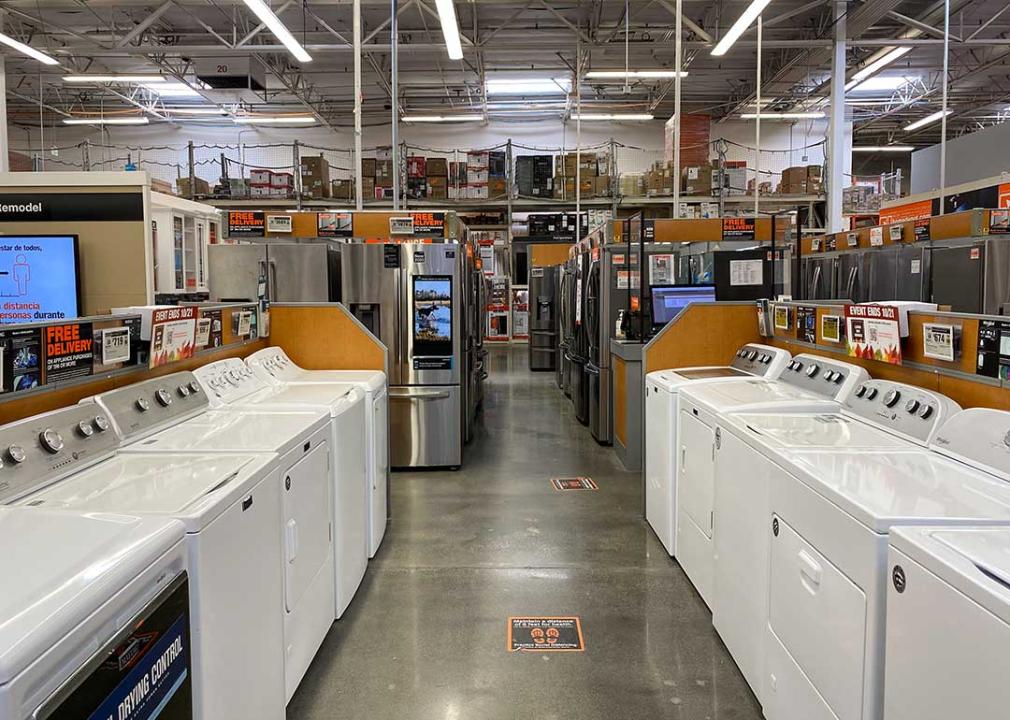Washers and dryers are about to get a whole lot more efficient

Unwind // Shutterstock
Washers and dryers are about to get a whole lot more efficient
washers and home appliances for sale at big box store
Doing laundry accounts for about 8 percent of a home’s annual electricity use, a figure that does not include the energy needed to heat the water swirling through the washing machine. Beyond that financial cost, the appliances contribute mightily to the nation’s carbon footprint. On Feb. 29, the Biden administration announced new washer and dryer efficiency standards that could ease those burdens.
The updated standards—first reported by Grist—will result in top-loading clothes washers that are 11 percent more energy efficient than similar current machines while using 28 percent less water. Dryers will see up to a 40 percent reduction in energy use, depending on the model. The requirements are in line with current Energy Star efficiency benchmarks, and will apply to equipment produced after March 1, 2028.
“These rules represent an opportunity for more efficient appliances that provide the same level of performance but have reduced operating expenses,” a Department of Energy official told Grist, speaking on the condition of anonymity. The government estimates that the measures will shave $2.2 billion a year from Americans’ utility bills and, over 30 years, eliminate 71 million tons of planet-warming carbon dioxide emissions. That’s equivalent to the annual emissions of nearly 9 million homes.
Consumers push for improved appliance efficiency standards
The updates are drawn from a deal manufacturers struck with environmental and consumer advocacy organizations in late 2023 that outlined efficiency standards and implementation timelines for six appliance categories. The government has already adopted the group’s recommendations for stoves and refrigerators and freezers. New criteria for other refrigeration products (such as wine coolers), as well dishwashers, are expected in 2024. If consumers were to swap the least efficient models available today to the most common models available under the new efficiency standards, they would save around $120 per year, according to the Appliance Standards Awareness Project, a nonprofit that helped negotiate the new standards.
“We are pleased that the [Department of Energy] accepted this joint recommendation that saves some energy,” Jill Notini, vice president of the Association of Home Appliance Manufacturers, or AHAM, said in an email. “[It] also allows manufacturers to provide consumers with the products and features they love and rely upon.”
New regulations aren’t immune from controversy
The updates come amid a conservative backlash. Fox News has dubbed the changes a “war on appliances,” that would leave clothes “dirtier and stinkier.” But Joanna Mauer, deputy director of the Appliance Standards Awareness Project, points out that Energy Star models tend to score higher than more conventional appliances in Consumer Reports testing.
“These new standards will help ensure that dryers aren’t over-drying clothes,” she said. “Over-drying clothes doesn’t just waste energy, but can also shrink or otherwise damage them.”
AHAM was among the organizations that pushed back on the government’s initial appliance proposals, which were released in 2022 and 2023, and succeeded in weakening several of them through the joint recommendations. The most notable change involved gas stoves—a debate that proved particularly contentious. The standards for some washer models were also slightly lower than those the Biden administration first put forward. But, Mauer said, they still “achieve the bulk of the potential consumer savings.”
Nonprofits bring lawsuit to spur lagging review of standards
This is the first time that washer and dryer standards have been updated in more than a decade, a step Mauer said is long overdue. By law, the government is supposed to review appliance standards every six years, a procedure that AHAM has criticized as “resulting in a never-ending regulatory churn regardless of who is in the White House.” But the Trump administration stalled the process, pushing revisions well past their deadlines. In 2022, the Department of Energy reached a legal settlement with environment, consumer and housing nonprofits that laid out the current schedule.
While he would have welcomed quicker change, Joe Vukovich, an attorney for the National Resources Defense Council who participated in joint recommendation negotiations, said the end result proves that progress is possible.
“It’s not a sector where manufacturers are just uniformly hostile to regulation,” he said. “Stakeholders can come together and get something that we view as a win-win.”
![]()